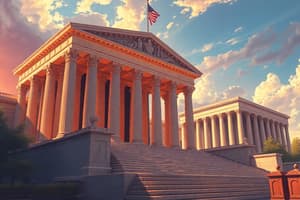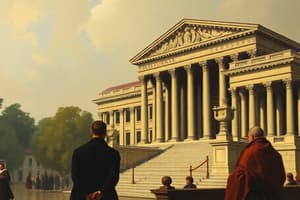Podcast
Questions and Answers
What is the primary aim of jurisdiction as an activity of the state?
What is the primary aim of jurisdiction as an activity of the state?
- To establish new laws.
- To increase state revenue.
- To regulate international trade agreements.
- To preserve the legal system and protect individual rights. (correct)
Which best describes a judicial system?
Which best describes a judicial system?
- A single court that handles all legal matters.
- A system of laws created by the legislative branch.
- A political body that creates legal policy.
- A group of different courts that exercise judicial power. (correct)
What is the role of the Constitutional jurisdiction?
What is the role of the Constitutional jurisdiction?
- To determine the constitutionality of laws. (correct)
- To oversee elections.
- To enforce international treaties.
- To draft amendments to the constitution.
What must all law norms and legal rules comply with?
What must all law norms and legal rules comply with?
What are the three types of controls generally conducted by Constitutional Courts?
What are the three types of controls generally conducted by Constitutional Courts?
Who has the right to file a lawsuit?
Who has the right to file a lawsuit?
What type of disputes does ordinary jurisdiction settle?
What type of disputes does ordinary jurisdiction settle?
How is ordinary jurisdiction typically divided?
How is ordinary jurisdiction typically divided?
Which of the following best describes the role of civil jurisdiction?
Which of the following best describes the role of civil jurisdiction?
In civil jurisdiction, what is considered 'general jurisdiction'?
In civil jurisdiction, what is considered 'general jurisdiction'?
What is the role of criminal courts?
What is the role of criminal courts?
Which of the following is an example of a crime against individuals?
Which of the following is an example of a crime against individuals?
Administrative jurisdiction deals with disputes related to what area of law?
Administrative jurisdiction deals with disputes related to what area of law?
Which court serves as a Court of Appeal in the administrative judiciary?
Which court serves as a Court of Appeal in the administrative judiciary?
What action can an administrative court take regarding a contested decision?
What action can an administrative court take regarding a contested decision?
What does account jurisdiction primarily oversee?
What does account jurisdiction primarily oversee?
What is the role of the General Prosecutor's Office in the Court of Audit?
What is the role of the General Prosecutor's Office in the Court of Audit?
What is a role of the supreme court?
What is a role of the supreme court?
The text mentiones all of the following roles, filled by some supreme courts, EXCEPT:
The text mentiones all of the following roles, filled by some supreme courts, EXCEPT:
What is the role of judicial organization in a country’s legal system?
What is the role of judicial organization in a country’s legal system?
Flashcards
Judicial jurisdiction
Judicial jurisdiction
The organization that aims to preserve the legal system and protect individual rights.
Constitutional Jurisdiction
Constitutional Jurisdiction
Overseeing legal conformity with the constitution.
Constitutional Courts Controls
Constitutional Courts Controls
Checks laws' consistency with the Constitution, covering linguistics, procedure, and purpose.
Ordinary Jurisdiction
Ordinary Jurisdiction
Signup and view all the flashcards
Civil jurisdiction
Civil jurisdiction
Signup and view all the flashcards
General civil jurisdiction
General civil jurisdiction
Signup and view all the flashcards
Special Civil Jurisdiction
Special Civil Jurisdiction
Signup and view all the flashcards
Criminal Courts
Criminal Courts
Signup and view all the flashcards
Administrative Jurisdiction
Administrative Jurisdiction
Signup and view all the flashcards
Account Jurisdiction
Account Jurisdiction
Signup and view all the flashcards
Supreme Court
Supreme Court
Signup and view all the flashcards
Study Notes
Judicial Organization
- Jurisdiction is an activity of the state to preserve its legal system and protect individual rights.
- Judicial systems are groups of courts exercising judicial power in a country.
- Judicial organization is the set of rules that fix the name, competence, composition, and place of courts in the judicial system’s hierarchy.
Constitutional Jurisdiction
- Constitutional jurisdiction is how the conformity of laws with the constitution is defined.
- All laws and legal rules must comply with the Constitution, which is the top of legal norms hierarchy.
- Constitutional jurisdiction emerged from laws needing to comply with the constitution.
Mechanism and Powers of Constitutional Courts
- Constitutional Courts ensure laws comply with the Constitution.
- Forms of control include linguistics, spelling, and punctuation verification.
- Procedure reviews the enactment process, including whether quorum rules for meetings and decisions were followed.
- Basis reviews the content, purpose, and essence of the subject matter.
Right to File a Lawsuit
- The President has the right to file a lawsuit.
- The ruling party and main opposition parliamentary group can file a lawsuit.
- A certain number of deputies have the right to file a lawsuit.
- Individuals can file lawsuits.
Ordinary Jurisdiction
- Ordinary jurisdiction settles civil and criminal disputes, and it’s the most common judiciary type based on geography and the number of parties involved.
- Ordinary jurisdiction is divided into civil and criminal jurisdictions.
Civil Jurisdiction
- Civil jurisdiction uses different courts/bodies to settle civil disputes separately from criminal or administrative cases.
- The competencies of civil jurisdiction are divided into two parts.
General & Special Civil Jurisdiction
- General civil jurisdiction: the civil judiciary can adjudicate any civil lawsuit not explicitly assigned to another jurisdiction.
- Special civil jurisdiction has exclusive competence for matters related to parentage, including legitimate, natural, or adoptive.
- Special jurisdiction covers copyright, declaration of absence, divorce, inheritance, and matrimonial regimes.
- Actions to claim real estate property fall under special civil jurisdiction.
- Addressing requests to cancel general assembly deliberations of co-ownerships requires special jurisdiction.
- Special jurisdiction includes addressing Commercial leases.
Criminal Courts
- Criminal courts are where those accused of violating criminal law have their criminal responsibility determined by juries or judges.
- Courts seek justice and discover the truth.
- Primary actors are prosecutors, defense attorneys, and judges.
Types of Crime
- Crimes against individuals include torture, theft, and fraud.
- Crimes against society include money laundering, forgery of official documents, and smuggling.
- Crimes against the nation and the state include bribery, treason, and violation of the Constitution.
- International crimes include genocide, war crimes, and crimes against humanity.
Administrative Jurisdiction
- Administrative jurisdiction grants administrative courts authority to adjudicate administrative law.
- These courts decide public law disputes unrelated to constitutional law, unless disputes are referred by law to other courts.
Organization of the Administrative Judiciary
- Administrative courts serve as first instance courts.
- Tax courts serve as first instance courts.
- Regional administrative courts serve as Courts of Appeal.
- The Council of State handles appeals by cassation.
Administrative Court Decisions
- Options at the end of a session may include revoking the contested decision.
- Options at the end of a session may include adjusting the contested decision in certain cases.
- The courts may order administration to compensate the applicant.
- The courts are also able to deny the request.
Account Jurisdiction
- Account jurisdiction involves inspecting the central government budget, social security institutions, and public administrations regarding revenues, expenditures, and property.
Organization of the Court of Audit
- The court of accounts is composed of financial judges divided into chambers along with designated personnel.
- The personnel is designated for functions of assisting in control and administrative organization.
- The general secretariat, composed of magistrates, ensures the direction of the administration of the Court.
- The General Prosecutor’s Office is at the Court and is headed by the General Prosecutor.
Supreme Court Roles
- Supreme courts in some countries are the highest court and carry National Jurisdiction.
- Supreme Court combines roles of constitutional court, ensuring law conformity; administrative court, ensuring government regulatory acts through judicial review.
- Further roles include the court of last instance for ordinary judicial and administrative matters.
- It may also act as the first and last instance for certain acts, dealing especially with excess of power.
Studying That Suits You
Use AI to generate personalized quizzes and flashcards to suit your learning preferences.




